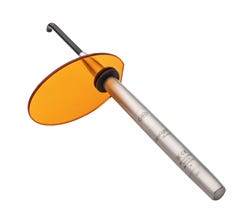A disk made from a polycarbonate (PC) developed by Bayer MaterialScience (Leverkusen, Germany) is helping dentists to home in on caries and precisely remove them using a minimally invasive procedure. The Makrolon LQ3187 material is used to manufacture a filter for the Facelight probe, manufactured by W&H Dentalwerk Bürmoos GmbH (Laufen/Obb., Germany), which identifies caries through fluorescence.
December 17, 2013
A disk made from a polycarbonate (PC) developed by Bayer MaterialScience (Leverkusen, Germany) is helping dentists to home in on caries and precisely remove them using a minimally invasive procedure. The Makrolon LQ3187 material is used to manufacture a filter for the Facelight probe, manufactured by W&H Dentalwerk Bürmoos GmbH (Laufen/Obb., Germany), which identifies caries through fluorescence.
 Bacteria that cause caries leave a footprint that fluoresces red when exposed to violet light (405 nm wavelength); healthy teeth produce a green glow. The disk is treated to filter out a specific portion of the violet excitation light, allowing the dentist to easily isolate and excavate the diseased portion of the tooth. The name Facelight is derived from FACE, which stands for Fluorescence-Aided Caries Excavation.
Bacteria that cause caries leave a footprint that fluoresces red when exposed to violet light (405 nm wavelength); healthy teeth produce a green glow. The disk is treated to filter out a specific portion of the violet excitation light, allowing the dentist to easily isolate and excavate the diseased portion of the tooth. The name Facelight is derived from FACE, which stands for Fluorescence-Aided Caries Excavation.
The full scope of a cavity may not be readily apparent to the naked eye, resulting in more extensive procedures. The light probe aids the dentist in detecting even very small caries and providing appropriate treatment without affecting healthy tooth substance.
Makrolon LQ3187 was selected for this application because of its transparency, optical properties, breaking strength, and impact resistance, according to Bayer MaterialScience. High-performance compounds are available for injection molding and extrusion.
About the Author(s)
You May Also Like


